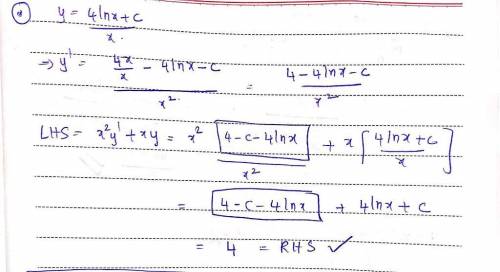
Mathematics, 19.03.2020 08:01 apodoltsev2021
Show that every member of the family of functions y = (6 ln(x) + C)/x , x > 0, is a solution of the differential equation x2y' + xy = 6. (Simplify as much as possible.) y = 6 ln(x) + C x ⇒ y' = 6x · (1/x) − (6 ln(x) +C) x2 LHS = x2y' + xy = x2 · x2 + x · 6 ln(x) + C x = + 6 ln(x) + C = = RHS, so y is a solution of the differential equation.

Answers: 1


Another question on Mathematics

Mathematics, 21.06.2019 21:40
The sum of the squares of two numbers is 8 . the product of the two numbers is 4. find the numbers.
Answers: 1

Mathematics, 22.06.2019 02:30
You had $235 in your savings account nine weeks ago. you withdrew the same amount each week for 8 straight weeks. your balence was then $75. solve the equation 235 - 8m=75 to find how much money m you withdrew from your account each week. 2 points
Answers: 1


Mathematics, 22.06.2019 05:30
Complex numbers multiply √-4 * √-25 and show all intermediate steps. alternative notation is sqrt(-4) * sqrt(-25).
Answers: 2
You know the right answer?
Show that every member of the family of functions y = (6 ln(x) + C)/x , x > 0, is a solution of t...
Questions

English, 05.02.2021 23:10


Mathematics, 05.02.2021 23:10

Physics, 05.02.2021 23:10

Mathematics, 05.02.2021 23:10


Mathematics, 05.02.2021 23:10

Mathematics, 05.02.2021 23:10


Mathematics, 05.02.2021 23:10

Mathematics, 05.02.2021 23:20


Mathematics, 05.02.2021 23:20

Mathematics, 05.02.2021 23:20






English, 05.02.2021 23:20




